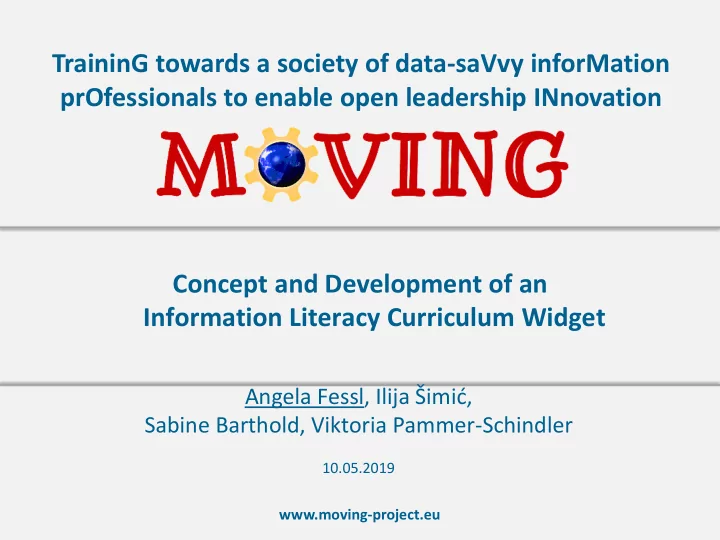

TraininG towards a society of data-saVvy inforMation prOfessionals to enable open leadership INnovation Concept and Development of an Information Literacy Curriculum Widget Angela Fessl , Ilija Šimić, Sabine Barthold, Viktoria Pammer-Schindler 10.05.2019 www.moving-project.eu
www.moving-project.eu Setting the Scene 2 of 19
Information Literacy & Digital Competence www.moving-project.eu • Information literacy, the access to and use of knowledge are becoming a precondition for individuals to • actively take part in social, economic, cultural and political life in societies • Information Literacy = fundamental competence • Similar to reading, writing and calculating • Information Literacy = „survival skill in the information age” 3 of 19
Goal: Automatic Learning Guidance www.moving-project.eu • How can we raise the learners competence level of each competence to the expert level? • Concept of a widget • Implementation in a newly developed search platform that provides automatic learning guidance • Supporting three modules of the DigComp 2.1. framework. 4 of 19
Related Work www.moving-project.eu • Micro Learning • „Micro -learning refers originally to taking short-term-focused learning activities on small learning content units “ ( Kovachev et al, 2011) • Reflective Learning • … is the conscious re -evaluation of past experiences with the goal to learn from them. • User Models • … are models that computer systems have about their users. 5 of 19
Research Questions www.moving-project.eu • RQ1: How does the interplay between micro learning and reflective learning need to be designed in order to effectively support the accommodation and assimilation of the learning content? • RQ2: How should the reflective prompts be formulated so that they are strongly related to the micro learning content and that they can be understood, are perceived as appropriate w.r.t. the users expertise, and lead to reflection? 6 of 19
MOVING Platform www.moving-project.eu https://moving.mz.tu-dresden.de 7 of 19
www.moving-project.eu Widget – Concept and Development 8 of 19
The Concept www.moving-project.eu 9 of 19
Information Literacy Curriculum www.moving-project.eu LEARNING MODULE SUB-COMPETENCES LEARNING GOALS Searching for information in Browsing, searching and filtering To articulate information needs, digital environments data, information and digital turn a (research) question into a content search strategy; To search and access data, information and content; To create and update personal search strategies; Evaluating data, information and To analyse, compare and digital content critically evaluate the credibility and reliability of sources and the data, information and content; Managing data, information and To organise, store, retrieve and digital content process data, information, and content; 10 of 19
Implementation: Prior Knowledge Assessment www.moving-project.eu • Questionnaire to initiate the widget • Knowledge is stored in the user model 11 of 19
Implementation: Learning Prompt www.moving-project.eu • Presents a prompt for being guided to the learning environment. • Prompt and content suggested depend on the status of the curriculum. • Presents the current learning status of the current module. 12 of 19
Implementation: Reflective Prompt www.moving-project.eu • Presents a prompt for reflecting about the previously learned module content. • Prompts are implemented on three levels, depending on the user’s experience and knowledge of the platform. 13 of 19
Implementation: Visualisation www.moving-project.eu • Overall visualisation of the learning progress w.r.t. the curriculum Learning Progress of 3 modules 14 of 19
www.moving-project.eu Discussion & Conclusion 15 of 19
RQ1: Interplay between micro and reflective learning www.moving-project.eu • Advantages: • Content is transferred using small bits and pieces • Automatically guiding learner through curriculum • Learner will cover all topics • Takes away workload w.r.t. what to learn next • Overall learning progress motivates to continue • Challenges • Reflective learning is an intrinsic process that cannot be enforced • Timing of reflection • Content of prompts need to be carefully considered 16 of 19
RQ2: Design of reflection prompts www.moving-project.eu • Goal: provide learners a clear benefit • Relate reflective prompt to micro learning content • Formulate reflective quesitons on different levels to improve self-reflection • Low-level reflective questions • „ How did the learning content help you to improve your filtering information skills? “ • Medium level reflective questions • „ Which activities you performed on the platform helped you to understand/apply the filtering information competence?” • High-level reflecitve questions • „ Did the acquirement of the filtering information skills improve your work performance? And if yes, how? 17 of 19
Conclusion www.moving-project.eu • Provision of an automatic learning guidance in form of a widget • Combination of micro learning and reflective learning • Implementation in a search platform • Next steps • Experimental studies to evaluate the widget • Implement the widget in some other projects 18 of 19
Project consortium and funding agency www.moving-project.eu MOVING is funded by the EU Horizon 2020 Programme under the project number INSO-4-2015: 693092 Thank you for your attention! Any questions? 19 of 19
Recommend
More recommend